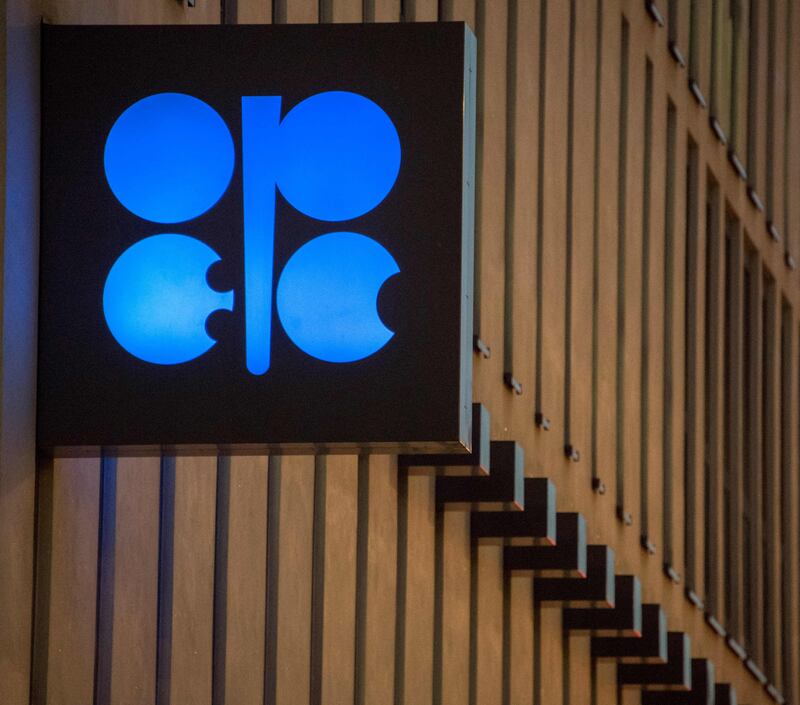Opec+ members extended their voluntary oil output reductions until the end of the first quarter of 2024 amid concerns over future fuel demand.
Saudi Arabia, the world's largest oil exporter, will keep its voluntary output cut of one million barrels per day until the end of March.
“The kingdom’s production will be approximately 9 million bpd … and to support market stability, these additional reduction quantities will be restored gradually, according to market conditions,” the Saudi Press Agency reported on Thursday, citing an energy ministry source.
The UAE will voluntarily cut its oil output by an additional 163,000 barrels a day starting January until the end of March next year, state news agency Wam reported on Thursday. The UAE's oil production will be 2.91 million bpd from January 1 till end of March, it added.
Russia said it would deepen its voluntary oil production cut to 500,000 bpd and extend it until the end of the first quarter of 2024.
Algeria plans to voluntarily reduce its oil production by 51,000 bpd in the upcoming quarter, while Oman will voluntarily cut oil output by 42,000 bpd during the same period.
Kuwait plans to voluntarily cut oil output by 135,000 bpd from January to March.
Brazil will join the Opec+ group of crude oil-producing states starting from January 2024, the group said, following the conclusion of its ministerial meeting on Thursday.
“The meeting welcomed Alexandre Silveira de Oliveira, Minister of Mines and Energy of the Federative Republic of Brazil, which will join the Opec+ Charter of Cooperation starting January 2024,” it said.
Opec+ has total production cuts in place of 3.66 million barrels per day, which includes a two million bpd reduction agreed last year as well as voluntary cuts of 1.66 million bpd announced in April.
Brent, the global benchmark for two thirds of the world's oil, was trading 0.40 per cent lower at $82.77 a barrel at 8.55pm UAE time. West Texas Intermediate, the gauge that tracks US crude, was down nearly 3 per cent at $75.54 a barrel.
The meeting, originally scheduled for November 26, was postponed by four days, which media reports and analysts said was due to disagreement over output levels for African producers.
Brent fell as much as 5 per cent in a single session last week as oil traders were surprised by the move.
The 2024 production quotas decided in June included a lower target for nine of the 23 member countries: Russia, Nigeria, Angola, Malaysia, Azerbaijan, Equatorial Guinea, Congo, Brunei, and Sudan.
Oil prices, which briefly touched $98 in September, have since fallen by nearly 16 per cent, despite predictions of a tight crude market in the fourth quarter by the International Energy Agency and Opec.
Crude jumped at the onset of the Israel-Gaza war last month on concerns that it would escalate into a broader conflict in the region, responsible for roughly a third of the world's oil production.
However, supply concerns have been eased, in part due to higher oil production in Iran and the easing of sanctions on Venezuela.
Despite US sanctions, Iran’s oil production is expected to reach 3.6 million bpd by March 2024, the country’s oil minister Javad Owji was quoted as saying earlier this month.
“We aim to reach four million bpd of oil production for next year,” he said.
Analysts do not expect softer sanctions on Caracas to translate to significantly higher production next year.
In October, the US Treasury Department issued a six-month general licence temporarily authorising transactions involving Venezuela's oil and gas sector.
In an earlier research note, Rystad Energy said the country would only be able to ramp up output by a maximum of 200,000 bpd over the next six months and added that any expansion in production would be hindered by the prolonged lack of investment in Venezuela's oil industry.
On the demand side, oil consumption in China, the world’s second-largest economy and top crude importer, is likely to ease in 2024 after surging to record levels this year despite sluggish growth in some sectors.
The International Energy Agency, which has raised its oil demand growth forecast for this year and the next, expects the Asian country to account for 1.8 million bpd of the total increase in demand in 2023 after consumption reached a record high of 17.1 million bpd in September.
In its latest monthly oil market report, Opec raised its forecast for oil demand growth for the current year on expectations of record demand from China and India in the fourth quarter.
Last month, the International Monetary Fund kept its global economic growth projection for this year at 3 per cent, slower than the 3.5 per cent expansion recorded in 2022, remaining below the historical growth average.
For 2024, the fund expects the global gross domestic product to expand by 2.9 per cent, a 0.1 percentage point downgrade from the fund’s forecast in July for next year.






